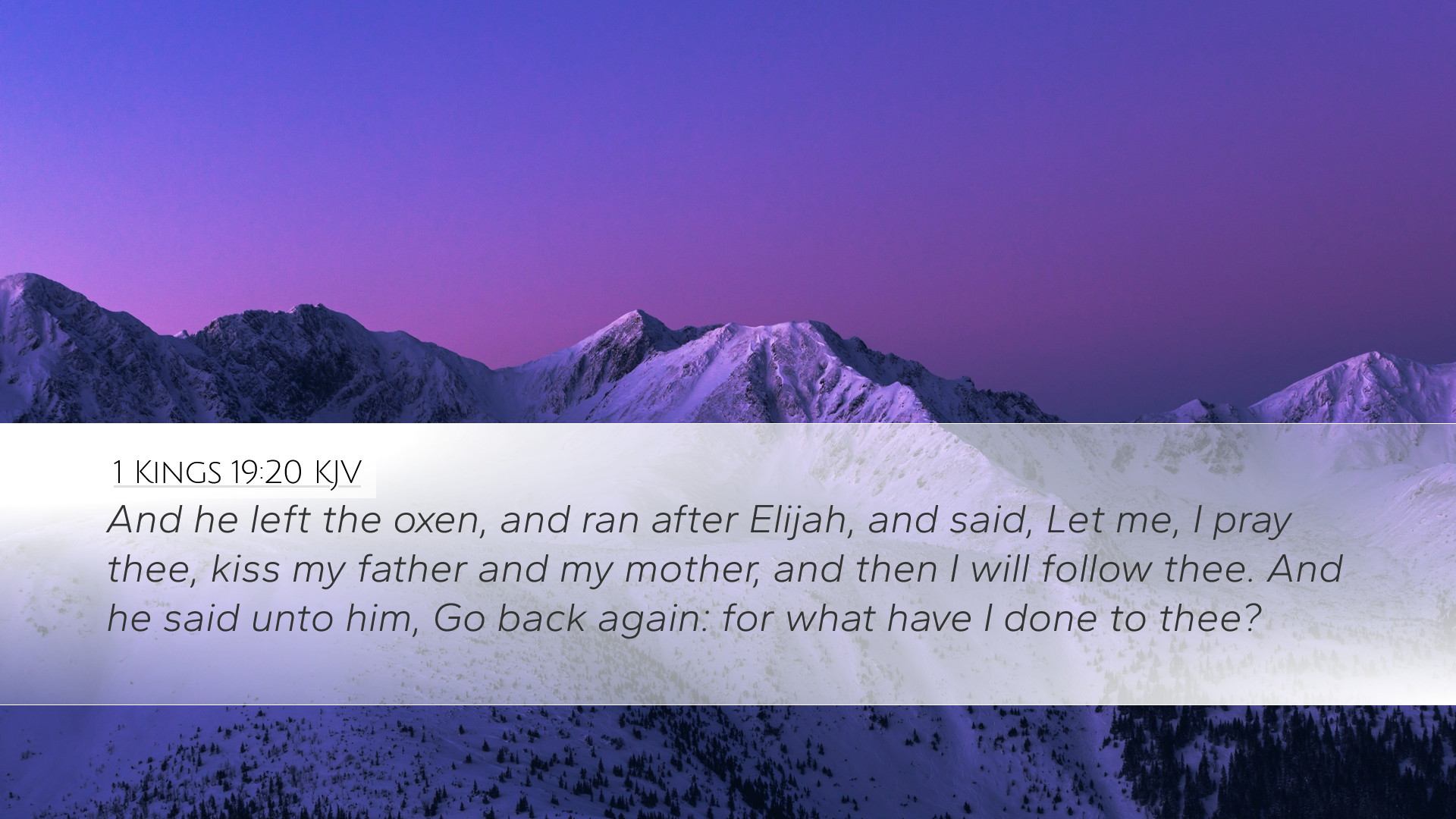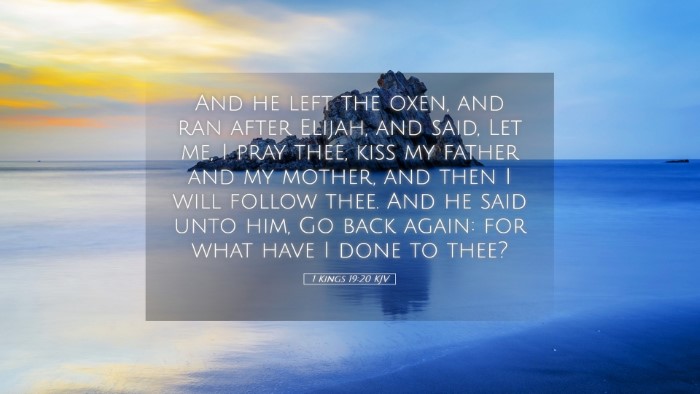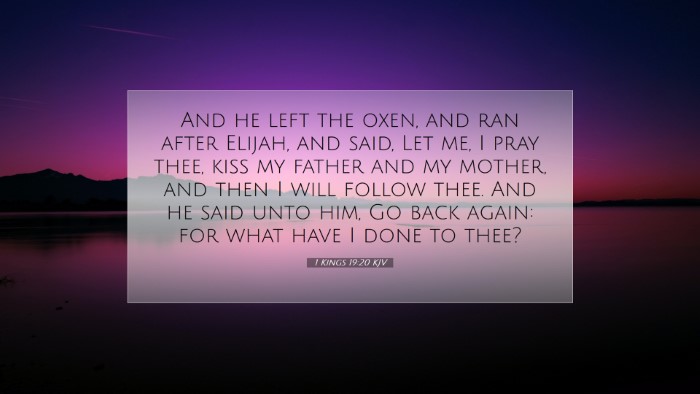Old Testament
Genesis Exodus Leviticus Numbers Deuteronomy Joshua Judges Ruth 1 Samuel 2 Samuel 1 Kings 2 Kings 1 Chronicles 2 Chronicles Ezra Nehemiah Esther Job Psalms Proverbs Ecclesiastes Song of Solomon Isaiah Jeremiah Lamentations Ezekiel Daniel Hosea Joel Amos Obadiah Jonah Micah Nahum Habakkuk Zephaniah Haggai Zechariah Malachi1 Kings 19:20
1 Kings 19:20 KJV
And he left the oxen, and ran after Elijah, and said, Let me, I pray thee, kiss my father and my mother, and then I will follow thee. And he said unto him, Go back again: for what have I done to thee?
1 Kings 19:20 Bible Commentary
Commentary on 1 Kings 19:20
Verse Analysis
1 Kings 19:20 states: "And he left the oxen and ran after Elijah, and said, Let me, I pray thee, kiss my father and my mother, and then I will follow thee. And Elijah said unto him, Go back again: for what have I done to thee?" This verse captures a pivotal moment in the calling of Elisha, the prophet who succeeds Elijah.
Contextual Considerations
This event occurs after Elijah's significant victory on Mount Carmel, where he defeats the prophets of Baal. Following this, Elijah flees to Horeb out of fear for his life, as Queen Jezebel seeks to kill him. It is in this period of despair and transition that Elijah encounters Elisha, thereby illustrating God’s providence in providing a successor. The action of Elisha leaving his oxen signifies a radical commitment to God's call and the prophetic ministry.
Elijah's Role in Elisha's Calling
Matthew Henry's Commentary highlights how Elijah served as a mentor figure. His initial response to Elisha's request subtly emphasizes the seriousness of the prophetic call. It is important to note that Elijah does not encourage Elisha's immediate departure but offers him the space to consider his decision deeply. This underscores a significant biblical theme: the importance of discernment in one's calling.
The Symbolism of the Oxen
The oxen represent Elisha's former life and career—farming and family responsibilities. By leaving them behind, Elisha signifies a complete break from his old life, a theme echoed in Christ's teachings about discipleship. Albert Barnes notes this act also represents a willingness to follow God's way over familial ties, reflective of Luke 9:62, where Jesus speaks of the necessity of commitment in discipleship.
Elisha's Response: A Model for Discipleship
When Elisha asks, "Let me kiss my father and my mother," he demonstrates a natural desire for familial farewell. The Adam Clarke's Commentary remarks that this request is not born of reluctance to follow but is indicative of a respectful farewell, highlighting the tension between duty to family and divine calling.
This moment captures a critical aspect of discipleship: the balance between honoring one's family and fully committing to God's purpose. The immediacy of the call reflects God's urgency in the life of a believer. The hesitation shown is human but also a personal faith journey toward complete surrender.
The Response of Elijah: Divine Authority
Elijah's response—"Go back again: for what have I done to thee?"—suggests a measured understanding of prophetic ministry. Guidelines for prophets were rigorous, and Elijah does not impose the call upon Elisha aggressively. Instead, he prompts Elisha to reflect on his own motivations. Matthew Henry indicates that this could be seen as allowing Elisha to satisfy his sentimentality while still affirming the gravity of the calling.
Implications for Ministry
This interaction between Elijah and Elisha exemplifies key components in pastoral transitions. It invites current leaders to consider how they are calling others into ministry, emphasizing encouragement and reflection rather than compulsion. It serves as a model for contemporary church leadership, highlighting the importance of recognizing individual struggles with readiness for a divine call.
The Theological Significance of Following
The act of following Elijah represents a series of spiritual steps crucial for any believer. The act of leaving one's past life behind often acts as a metaphysical representation of repentance and a decision to embrace a new identity in Christ. The passage invites reflection on the theological understanding of calling, sacrifice, and the personal relationship with God.
Applications for Today
- Reflection on Calling: Individuals are encouraged to meditate on their own callings. Just as Elisha paused to reflect, modern followers of Christ must consider the weight of their commitments.
- Family and Commitment: Balancing familial obligations with divine calling remains a significant challenge. Believers today might find a similar tension in making life choices that align with God's will.
- Mentorship in Ministry: Elijah’s example invites existing leaders to foster mentorship, creating an atmosphere where potential leaders can flourish.
Concluding Thoughts
The narrative captured in 1 Kings 19:20 serves as an excellent exposition of the tension between divine calling and earthly ties. Through the lives of Elijah and Elisha, we witness a profound emphasis on commitment, reflecting a life wholly submitted to God's purposes. As we study this text, may it inspire pastors, theologians, and students to embrace their individual callings while also fostering environments for others to discern their divine paths.


